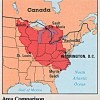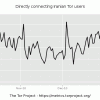Cameran Ashraf is head of Human Rights at the Wikimedia Foundation, an assistant professor at the School of Public Policy, Central European University, and co-founder of international human rights and technology organization AccessNow. In recognition of his work, the European Parliament selected AccessNow as a finalist for the 2010 Sakharov Prize for Freedom of Thought, the European Union's highest human rights honor.
In 2009 he assembled a team which provided digital security and communications tools to thousands of threatened activists and journalists while securing key websites during Iran's Green Movement, “the first major world event broadcast worldwide almost entirely via social media”. This work led Cameran to co-found AccessNow, one of the world's largest international human rights organizations dedicated to defending and extending digital rights.
Cameran has been invited to speak at Harvard University, the Massachusetts Institute of Technology, UC Berkeley, the Organization for Security and Co-operation in Europe (OSCE), and as an invited expert for the Kofi Annan Commission. He has also appeared in the New York Times, National Public Radio, Wired Magazine, and Bloomberg BusinessWeek.
He has advised the International Criminal Court on digital security, given expert input to the offices of U.S. Senators on internet censorship policy, and is a recipient of the University of California's Herbert F. York Global Security Fellowship.
Cameran continues to work for human dignity and human rights at the Wikimedia Foundation and through teaching, research, and meaningful engagement with students. From 2018-19 he served as Deputy Director of the Open Society Foundations Internship for Rights and Governance, helping to prepare the next generation of human rights defenders. Cameran completed his Ph.D. at UCLA on the geopolitics of Internet censorship and cyberwar.
Latest posts by Cameran Ashraf
Who Do We Lose with Internet Censorship and Control?
"Through Internet censorship and control we lose an ability to be our own secret human – the one we are when nobody is around."
The Psychological Strains of Digital Activism
Iran's Green Movement marked one of the first large-scale movements where new media served as a platform for coordination and communication between activists and played a vital role in showing the world what was happening on the ground. The post offers a first-person narrative on this experience from Cameran Ashraf, an Iranian-American citizen living in the United States who helped facilitate communication and information exchange for activists and protesters during this period.
Understanding Iran's Cyberpolitical Context
Since I last posted, events on the ground and online in Iran have continued to escalate. This is broadly in line with my belief that the Iranian government has decided to engage in a long-term project to silence dissent online, using both state and non-state actors, as well as to...
Cyber “long war” continues in Iran
The past few weeks have seen attention focused on Tunisia and Egypt in hopes of understanding what role, if any, information and communications technologies (ICTs) are playing in the recent unrest in both countries. While experts and pundits continue to discuss and debate, Iran's efforts at silencing the Green Movement...
Iran's Cyber Police, Geography, and the Psychological Denial of Service
National Public Radio reports that Iran is planning on dispatching “cyber police” across the country with General Ahmadi Moghaddam stating that “There is no time to wait” in deploying the Islamic Republic's latest line of defense against its real and perceived enemies. This isn't the first time Moghaddam has claimed...
Iran: Blocking activity, email interception, and renewed pressure on the Green Movement
The Tor Project reports that the Iranian firewall is now blocking or throttling Tor, a number of other circumvention tools as well as SSL. They recommend using bridges that are not on port 443. Below are several graphs from the Tor Project demonstrating this: Within Iran there are further conflicting...






